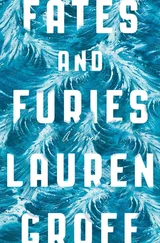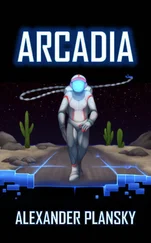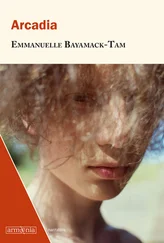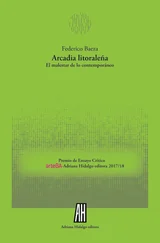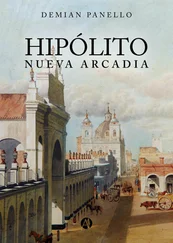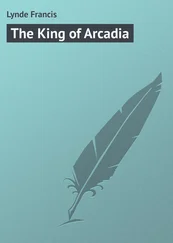Lauren Groff - Arcadia
Здесь есть возможность читать онлайн «Lauren Groff - Arcadia» весь текст электронной книги совершенно бесплатно (целиком полную версию без сокращений). В некоторых случаях можно слушать аудио, скачать через торрент в формате fb2 и присутствует краткое содержание. Год выпуска: 2012, Издательство: Hachette Books, Жанр: Современная проза, на английском языке. Описание произведения, (предисловие) а так же отзывы посетителей доступны на портале библиотеки ЛибКат.
- Название:Arcadia
- Автор:
- Издательство:Hachette Books
- Жанр:
- Год:2012
- ISBN:нет данных
- Рейтинг книги:3 / 5. Голосов: 1
-
Избранное:Добавить в избранное
- Отзывы:
-
Ваша оценка:
- 60
- 1
- 2
- 3
- 4
- 5
Arcadia: краткое содержание, описание и аннотация
Предлагаем к чтению аннотацию, описание, краткое содержание или предисловие (зависит от того, что написал сам автор книги «Arcadia»). Если вы не нашли необходимую информацию о книге — напишите в комментариях, мы постараемся отыскать её.
Arcadia — читать онлайн бесплатно полную книгу (весь текст) целиком
Ниже представлен текст книги, разбитый по страницам. Система сохранения места последней прочитанной страницы, позволяет с удобством читать онлайн бесплатно книгу «Arcadia», без необходимости каждый раз заново искать на чём Вы остановились. Поставьте закладку, и сможете в любой момент перейти на страницу, на которой закончили чтение.
Интервал:
Закладка:
No violence, Hannah says.
There is a shuffling in the hallway, and they stop to listen until whoever it is moves on. Honey, Bit, I can’t force you to do anything you’re uncomfortable with, she whispers. If you say no, I’ll get out there as fast as I can, but I don’t know the secret paths through the woods like you. You’re so fast and quiet. But you have to know about the consequences of getting involved. We could go to jail or get shamed out of Arcadia if we’re caught. It’s your choice. We’ll always love you, no matter what you decide. We respect what your conscience tells you to do.
Her voice, though: the tightness in it. It just kills him. All right, he says.
Abe exhales. All right, he says. It’s the little island in the stream north of Verda’s. She knows all about the Pot Plot, she sympathizes. Go as fast as you can off the path, and when Hannah can hike out there, she’ll take over the watch from you. Ready?
Bit thinks, No.
He says, Ready.
Run, Abe says.
Bit runs. The smoke of the bonfire in the Sheep’s Meadow is already strong. They must have pulled up a patch already. He is beyond the tents that have spread in the past year into the woods, for the people who can’t find cots in the separate encampments; he is beyond the smell of the fields, the loos, the compost heaps. He can hear people crashing through the forest, clumsy ogres. Bit knows the deer paths. He goes, invisibly, beyond where they are. Past the noise, the old watchful silence of the woods presses in on him: he settles into his legs and lets the trees whip by. He startles a crane from a pool, sends the white tails of deer bounding over logs. Miles later he slows and sees the island turtling out of the stream. Only when he has waded through the hip-deep water and has come a few steps in does he see the plot, cleverly hidden on the eastern side of the trees. The helicopters, Hannah had known, would come from the navy base in the west or the army base to the south.
When Bit’s heart has stopped its pounding, he washes the dried mud from his chest and shoulders, finds a bucket tied to a tree, and makes himself useful, watering.
He hides again in a cold pit in the willows and looks back toward Arcadia. He sees nothing, hears nothing but the ordinary sounds of the woods settling after his disturbance. A contrail puffs fat overhead. A muskrat draws two slender lines in the water. After some time he swivels his head and looks toward Verda’s cottage sending up its thin stream of smoke.
He has known Verda forever, since he was six. Before he knew these miles of woods like his own small body, he would get lost on his wanders. He met the old woman one night when he was in a snowstorm and dark was falling fast. He had lost a red mitten, and he put both his hands in the remaining one and held it in front of him as if it were a lantern to light his way. But the forest was avid: it wanted, that night, to eat him. Through spindrift he had trudged, through black. At last, he had smelled salvation in woodsmoke and followed it to a stone cottage squatting at the edge of a field. He knocked and knocked. The door fell open to the witch he’d first seen in the dark woods the spring before, the strange dog at her side that Bit had thought was a tamed white doe. Bit had been too tired and too cold to feel fear, until his wet clothes were off and there was a blanket on him, smelling of sun and lavender. Then the witch leaned into her woodstove and the light caught and underlined her sharp nose, her wrinkles, her lank hair, and some spark of a story alit in his head and Bit began to scream. From the hearth, the white beastie watched him, panting in the heat. The witch let Bit scream until he lost his voice, and when he did, she handed him a bowl of soup. It was venison, the first meat he had ever eaten. It tasted like death. He threw it up. He found himself in a truck, and Titus came to the Gatehouse door, Saucy Sally and the baby in the lanternlight behind him. Titus began to cry with relief: Oh, Bit, you’re found, he said, gathering him up in his great heavy arms. We thought you were froze to death. Bit looked back into the night, and the witch put her thumb on his chin. Little Ridley, she said softly. Come back and see your Verda sometime; and she disappeared from the dream he’d thought he was in.
Now he tries to send Verda brainwaves to bring a handful of shortbread and a blanket, but she doesn’t hear or heed his silent calls. He tries not to think of what would happen to him in a jail-type situation. He is so small still; he looks far younger than he is. He has heard bad stories of juvenile hall, filtered up from the runaways, and his mind shies away from ideas of violence and nasty food and never seeing his parents again. In the sky blazes Venus, a calm blue, and Bit thinks of last year’s syzygy, the alignment of planets, how Ollie was so convinced of apocalypse that he spent March in the reinforced tunnel between Arcadia House and the Octagonal Barn. When the anxiety gets to Bit, he rolls a green leaf into a little cigarette and lights it with the matches all Old Arcadia kids keep in plastic bags in their pockets, with Swiss Army knives and some gorp. When he’s calmer, he laughs quietly to himself and startles a chipmunk into a tree.
In the shadows of the trees, it grows cold. Bit’s cutoff jeans have dried on his legs, and he has to clutch his limbs to his torso to keep from shivering. Dusk thickens. The forest breathes in a way he can’t hear when he is amid the clamor of Arcadia. On the path a few hundred yards away there is a rustling, the distinct sound of human steps, and he stands, a rock absurdly heavy in his fist. But it is Hannah. She’s wearing the same ripped-sleeve flannel shirt and cutoff shorts as before but now has a knapsack on her back and her work boots on her feet, as if she were off for an innocent hike.
She presses a finger to her lips and wades across the stream. When she hugs Bit, she must feel how cold his skin is, and she takes off her shirt, baring her bra to the air. She drapes the shirt on him. It holds the warmth of her body in the weave, her bready smell. You’re the best, Little Bit, she whispers. Lila and Hiero weren’t too far away from me on the path, so be careful.
He carries the weight of her hug, a ghost of Hannah, on the run back home. He comes out into the Sheep’s Meadow in the pale twilight just as the gong begins to ring, calling the first shift of Arcadians, the most fragile, the Hens and Trippies and kidlets, to their supper.
Bit wakes, pulsing with dread. From his top bunk, Cole’s hand reaches out and pats him on the chest. Just sheep, Bit’s friend mutters, you’re okay.
Baa baa, murmurs Ike, still asleep in his own bunk.
Bit concentrates on ujjayi breath to calm himself, imagining the windmill in the back of his throat. The same nightmare has circled in Bit since he was little and Handy put actual sheep in the Sheep’s Meadow: not to exploit, he explained, they’re not pets and they won’t be eaten, but for their wool, which they gladly gave and which the Arcadians could sell. The kidlets loved the sheep; the women dreamed of woolen sweaters, lanolin on their chapped hands. Then Tarzan, who appointed himself shepherd, came down dizzy, with great open sores, and Astrid came speeding back from the hospital in Syracuse where the AmbUnit had rushed him, her hair wild, her face frantic. For hours, Abe and Handy and the midwives and Titus, the people who wore power in Arcadia then, conferred. That night, Bit woke to an unfamiliar stink. He crept out of the Children’s Dormitory to follow the acrid smoke. He found a grim group of three in the meadow around a bonfire. When he came closer the fire turned gruesome, the bodies of the sheep in a ziggurat within the flames. Bit watched a lamb’s eyeballs explode. He sat in the darkness, struck frozen until Astrid, who stood apart from Hank and Horse, brought a hand up to push her hair from her face, and her arms were blackened to the elbows with blood.
Читать дальшеИнтервал:
Закладка:
Похожие книги на «Arcadia»
Представляем Вашему вниманию похожие книги на «Arcadia» списком для выбора. Мы отобрали схожую по названию и смыслу литературу в надежде предоставить читателям больше вариантов отыскать новые, интересные, ещё непрочитанные произведения.
Обсуждение, отзывы о книге «Arcadia» и просто собственные мнения читателей. Оставьте ваши комментарии, напишите, что Вы думаете о произведении, его смысле или главных героях. Укажите что конкретно понравилось, а что нет, и почему Вы так считаете.
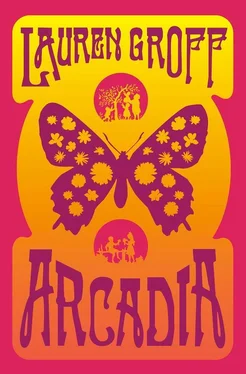
![Andrea Höst - In Arcadia [Touchstone - Extras]](/books/56405/andrea-host-in-arcadia-touchstone-extras-thumb.webp)

